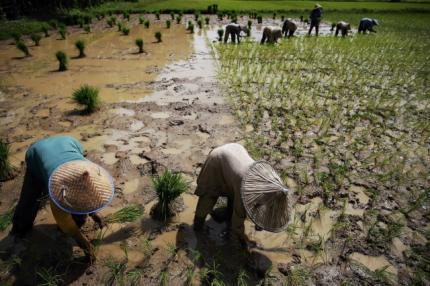Asia readies food security defences against El Nino threat
Indonesia, Philippines at greatest El Nino risk

Indonesia, Philippines at greatest El Nino risk
Bareksa.com - Asia's governments are scrambling to head off the potential impact of a weather phenomenon that in the past has driven food prices to levels that sparked social unrest.
With lessons learned, Indonesia's government is handing out calendars to farmers setting out early planting dates. Malaysia and the Philippines are working to manage water supplies and India has bolstered its food stockpiles.
They are aiming to reduce the impact of the so-called El Nino, a weather pattern that can bring drought to Australia, Southeast Asia and India.
Promo Terbaru di Bareksa
Drought linked to a 2007 El Nino sparked a surge in food prices, including a trebling in the cost of rice to a record over $1,000 a tonne in 2008 that sparked riots in countries as far afield as Egypt, Cameroon and Haiti. The last El Nino in 2009 brought the worst drought in nearly four decades to India, cutting rice output in the world's number two producer by 10 million tonnes and boosting global sugar prices to the highest in nearly 30 years.
A majority of weather forecasting models indicate an El Nino is likely to develop around the middle of the year, according to the U.N. weather agency.
"Traditionally, the countries that are affected most are Indonesia and the Philippines," said David Dawes, a senior economist at the U.N.'s Food and Agriculture Organisation in Bangkok.
"Certainly for rice because of a combination of two things: it's their production most likely to be affected, and they're importers so would have to go onto a world market with potentially rising prices."
A dry spell has already hit the Cagayan Valley in the northern Philippines, the agriculture ministry said, with major dams at critical levels in what is one of the biggest rice-producing regions.
The government said it has begun cloud seeding and the release of drought tolerant varieties of rice.
"We are putting in place policy initiatives, water management and conservation measures, as well as modern and innovative farming and fishery technologies to somehow soften the effects of this dry weather," Agriculture Secretary Proceso Alcala said.
Strong typhoons often follow an El Nino weather event in the Philippines, which could mean further crop losses, said Mary Ann Lucille Sering, Secretary of the Philippine Climate Change Commission.
"Rice imports will be an option for us," Sering said. The country is already the region's number two rice importer after China.
In Indonesia the agriculture ministry has instructed farming advisors, paid by the government to assist farmers with modern techniques, to bring forward planting of certain crops.
"Hopefully with this action, we can still grow crops and minimise the risk of drought," said Tunggul Iman Panudju, director of land development and management at the agriculture ministry. He added that El Nino may provide opportunities to plant rice on land previously designated as swamp.
Calendars detailing specific crop planting dates will be issued to help farmers, Deputy Agriculture Minister Rusman Heriawan told the Jakarta Post, adding that the Public Works Ministry was readying supporting equipment such as water pumps.
Indonesian farmers are being trained in ways to adapt to changing weather patterns, and depending on the province, urged to plant alternative crops to rice that can cope better with dry conditions, the head of Indonesia's weather agency told Reuters.
Malaysia's government has formed a water crisis committee, headed by the deputy prime minister, that will work with various ministries to monitor any El Nino impact. The government is also encouraging industry to use underground or recycled water and increase the capacity of water storage tanks.
BUMPER STOCKS
A major difference from the last El Nino in 2009 is that food stockpiles have risen, which should help mitigate any impact on prices.
India is sitting on a mound of staple foods such as rice, wheat and sugar, largely thanks to bumper harvests in the last few years, while Thailand is in the process of selling down rice stocks built up during an ill-fated subsidy scheme.
Global rice stockpiles have risen by 15 million tonnes since 2009 to stand at 109 million tonnes now, according to the U.S. Department of Agriculture, with the bulk of the increase in India, Thailand and China.
"If the monsoon rains fail to meet expectations, we are prepared to release more rice and wheat from government stocks into the open market to ensure prices do not go up," said an Indian food ministry official, who did not want to be identified because he is not authorised to speak to the media.
India's central government will also provide seed varieties that can cope better with dry conditions, and funding to state governments when needed, he added.
In Thailand, which before the subsidy scheme made its rice uncompetitive was the world's largest exporter of the grain, stocks had swelled to around 17 million tonnes. (Source : Reuters)
Pilihan Investasi di Bareksa
Klik produk untuk lihat lebih detail.
| Produk Eksklusif | Harga/Unit | 1 Bulan | 6 Bulan | YTD | 1 Tahun | 3 Tahun | 5 Tahun |
|---|---|---|---|---|---|---|---|
Trimegah Dana Obligasi Nusantara autodebet | 1.203,01 | ||||||
STAR Stable Amanah Sukuk autodebet | 1.182,67 | - | - | ||||
Syailendra Sharia Fixed Income Fund Kelas A | 1.153,01 | - | - | ||||
Eastspring Syariah Mixed Asset Fund Kelas A | 1.044,45 | - | - | - | - | - |

Produk Belum Tersedia
Ayo daftar Bareksa SBN sekarang untuk bertransaksi ketika periode pembelian dibuka.

Produk Belum Tersedia
Ayo daftar Bareksa SBN sekarang untuk bertransaksi ketika periode pembelian dibuka.